“I felt an overwhelming nostalgia for Hungary, which gave me the strength to work for Hungarians in Venezuela” – Interview with a Three-Generation Scout Family
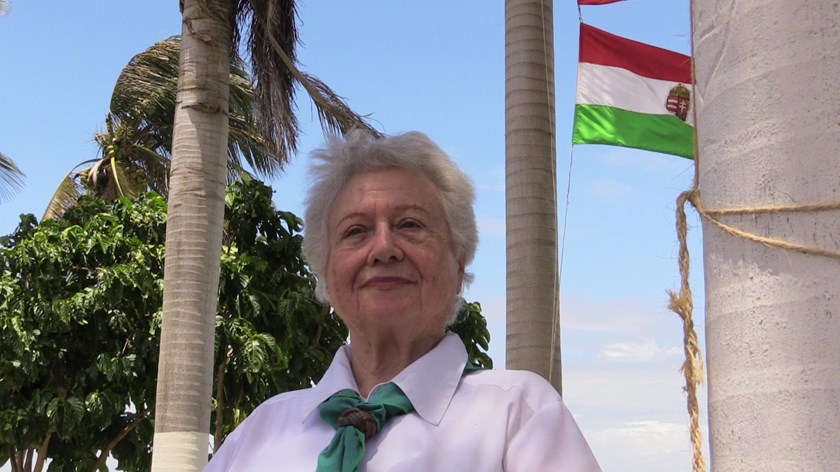
“I felt an overwhelming nostalgia for Hungary, which gave me the strength to work for Hungarians in Venezuela” – Interview with a Three-Generation Scout Family
How do three different generations experience the severe political and economic crisis in Venezuela? How can the Hungarian Scout Association help, and how can the scouts even exist after years of Hungarians constantly leaving the country? Judit Kristóffy Nyisztor fled to Venezuela from the Soviet occupation of Hungary with her parents at the age of 10 – she says that now they experience almost the same uncertainty that she did as a child. Her daughter was born in Venezuela, while her granddaughter is a true Venezuelan-Hungarian girl who not only represents, but also educates the new generation of Hungarian scouts in the South American country. Hungary Today’s sister site, Ungarn Heute had the opportunity to talk to the 3-generation scout family, Judit Kristóffy Nyisztor (JKNY), her daughter, Ildikó Nyisztor (INY) and granddaughter, Zsófia Mirabal (ZSM) at the annual Friends of Hungary Conference, where the Hungarian Scout Association received the ‘Friend of Hungary‘ Award.
***
You arrived on the last plane to Hungary from Venezuela. After the plane took off, the country’s airspace closed for a few days. What did you think in that moment?
JKNY: We didn’t think it would be the last plane for a short time, but we were very happy to make it on board. It was not a smooth journey: we first landed in Curacao, then Lisbon, where we missed the connecting flight. We traveled a total of 29 hours before we arrived in Hungary.
From the perspective of three different generations, do you see and experience the Venezuelan crisis differently?
INY: We surely live it differently. My mother is 84 years old, has been through the Second World War, and then she had to flee her home country from Soviet occupation. It would be difficult for her to start over and come back to Hungary. I’m still young for a change, but I’ve built my life in Venezuela, everything ties me there: my apartment, my job, and my daughter.
ZSM: I’m only 18 years old, I’m still going to school, I’m going to graduate from high school now; but I also really want to stay at home in Venezuela and go to university there.
Of course, the situation is difficult, which is why the idea arose to come to either Hungary or Germany to continue my studies.
However, for me, Venezuela means home. I love it dearly and imagine my life there.
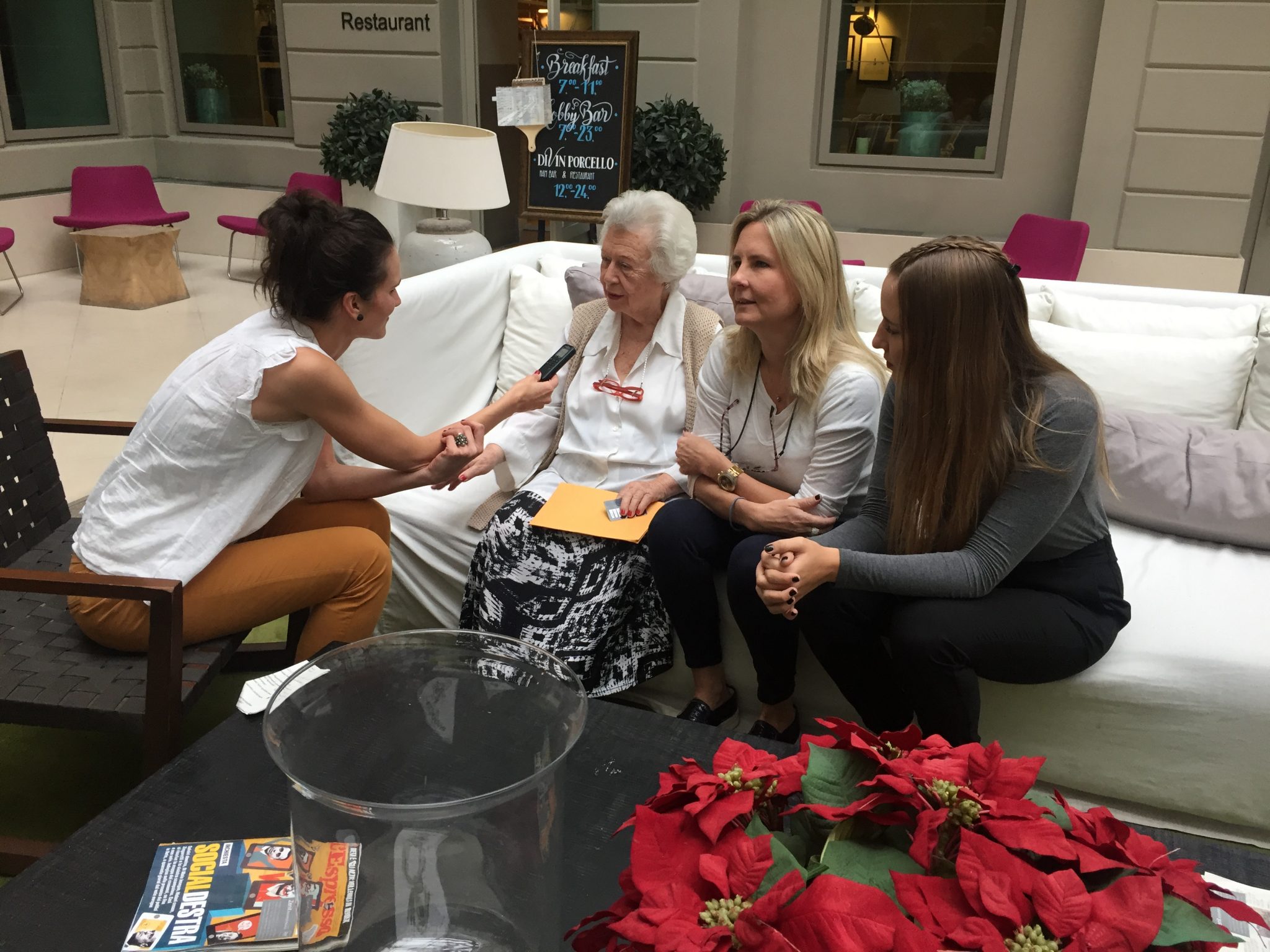
From left to right: Judit Kristóffy Nyisztor, her daughter, Ildikó Nyisztor and granddaughter, Zsófia Mirabal.
There is a lot to see and hear about Venezuela in the news, yet it’s hard to imagine everyday life. What’s the hardest part?
JKNY: Shopping is a big problem, for one. Where do I get sugar or flour? Sometimes you have to go from one place to another to get everything. Our material circumstances have also changed a lot. The hyperinflation is so high, everything became so expensive that almost every meal is a problem. We lowered our needs a bit, we eat much more modestly. Imported, fine foods have not been available for a long time now, but of course we are fine without them as well. I have already lived like this when we fled to Austria and then to France after ’45… Back then, we learned how to divide up what little we had.
INY: The other issue is public safety.
We take Zsófi everywhere by car, we do not let her go anywhere alone. So her freedom is also limited; but you have to take care.
After 7-8 p.m, the streets are empty and it is very dangerous to leave the house at night. This is something that would make me consider leaving the country.
This is a constant worry for a parent. How does an 18-year-old see this? Zsófi, are you afraid to go out in the streets? Is it even possible to deal with this issue more casually at a younger age?
ZSM: This is a very difficult question, because obviously, young people there also like to go out to parties, meet with friends, or sit in a restaurant, just like anywhere else… I always have to go everywhere by car. We live this way, and I have accepted it. I love Venezuela.
Is this situation transforming the communities? A lot of Hungarians have recently come back home…
JKNY: Yes, of course, it transforms the community. There is a very nice place, our “Hungarian House,” where we always had a very active social life: we organized lunches, sports teams, and scouts still get together there. It has now reduced to minimal activity. Scout life and activities are limited, as fewer children are able to come to the events. And with the repatriation program, many Hungarians have come home from Venezuela. So the numbers of the Hungarian community have fallen quite a lot.
Can such a crisis situation strengthen the role of scouting?
INY: Yes, because the social work done by scouts is even more necessary. We can help and try to improve the situation of many poor people. Obviously, this work has become more difficult for us as well, because our numbers are falling, but we are trying to adapt to this situation.
JKNY: Because of the worsening public safety situation, the number of scouting trips has also decreased. We have to look at carefully where we are going, what parts of the country we can safely travel to. Caracas is a beautiful city, there is a giant mountain, there would be many places to go to, but now, in this situation, we cannot let the children go alone.
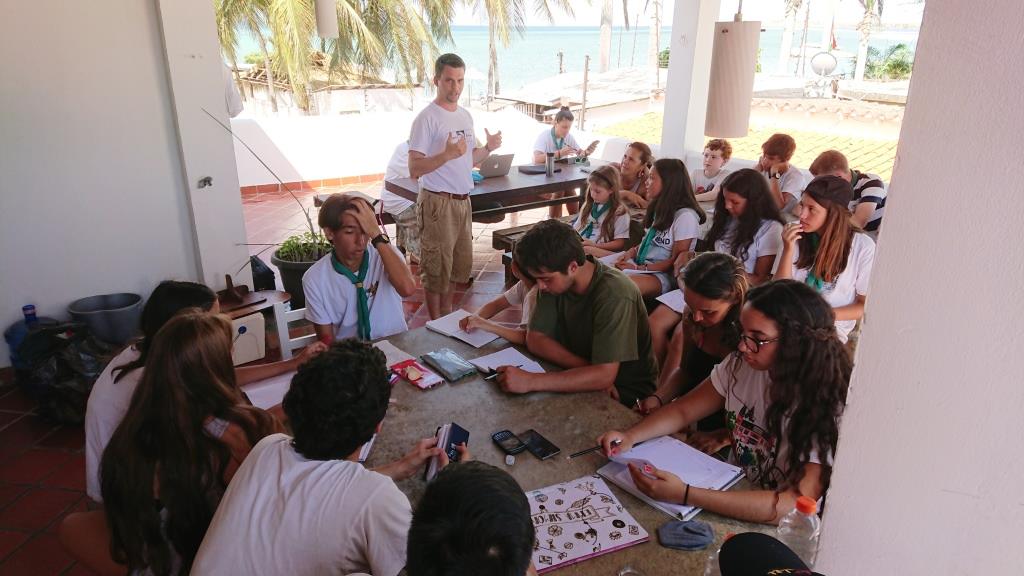
Hungarian scouts in Venezuela. (photo: venezuelaimagyarok.blog.hu)
And that is one of the main features and essence of scouting that older children are watching out for the smaller ones; more precisely, they teach the little ones a lot of things. Does the crisis overwrite this habit?
INY: Yes, of course. For example, every year we have a 1-week camp at Easter. This year, it was only 3 days long, because of the crisis. Parents, completely understandably, were afraid to let their children go for a longer time and further away.
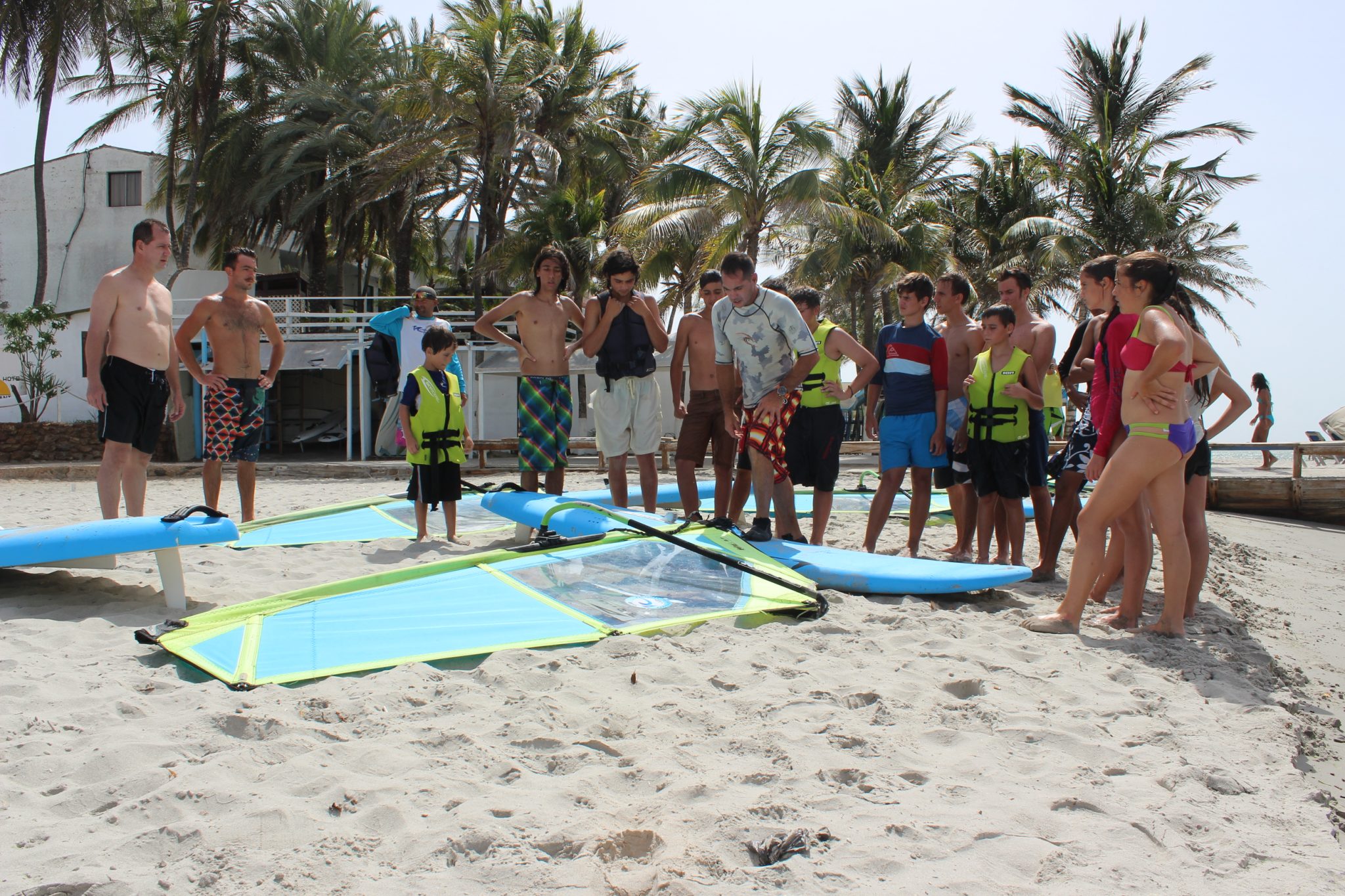
Schoolchildren learn Hungarian folk dance, windsurfing and even the “Hungarian Knot” on Isla de Margarita in 2016. (photo: venezuelaimagyarok.blog.hu)
Can politics filter into the life of scouting? Does it let the communities work?
INY: Fortunately, politics is letting us do everything our way, and we still have the freedom in the work we do. Of course we are not politicizing, perhaps because of this. We are trying to work for the people and to pass along ‘Hungarianness’ to the children.
Zsófi, I guess you were born into the scouts, or at least you became involved at an early age?!
ZSM: Yes, I became a scout at the age of 7, and since then I’ve been an active member. Not long ago, I completed the group leader training in Fillmore, NY.
Although the situation in Venezuela is not that good now, it is great that at least we have scout groups.
They may be small, but we carry on and work: we have two groups, one is the girl’s group, St. Elizabeth, and the other is St. Stephen, for the boys. Whatever happens, we’ll continue it, even if there are just seven of us now. We love Venezuela, Hungary and Hungarian Scouting. The goal is to preserve and pass along our Hungarian identity.
You mentioned several times that the number of Hungarian Scouts has dropped a lot. Are there any exact statistics on this?
JKNY: Yes, unfortunately this is the case. While 30 years ago there were 60-60 scouts per team, this number started to reduce over the years. 20 years ago, we only had 45-50 members. Now, together with the leaders in the two groups combined, there is a total of 25 scouts here.
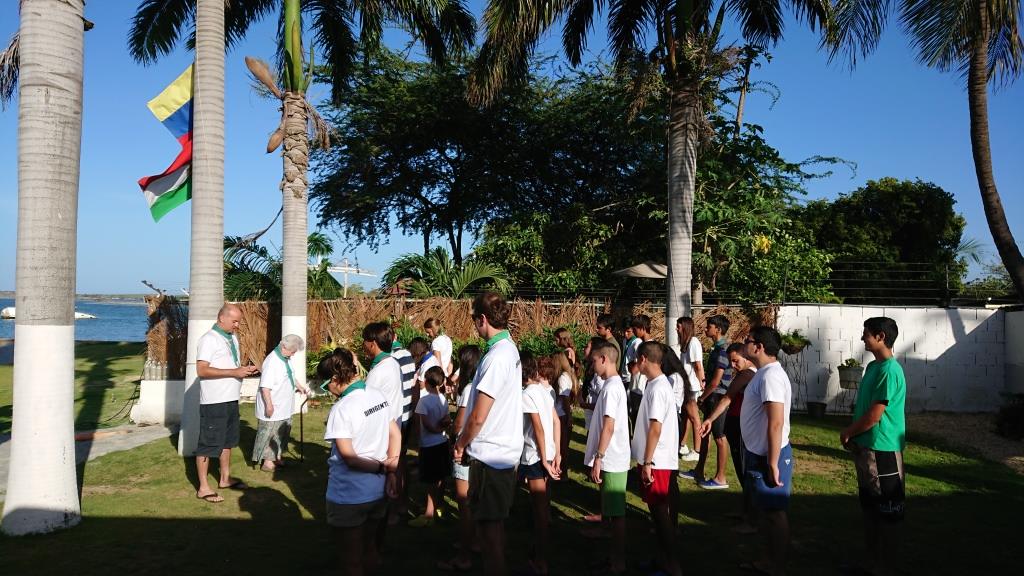
Hungarian Scouts in Venezuela.
The Hungarian community is also shrinking, and many have come back to Hungary in recent years. Does this also make it more difficult to recruit new members?
JKNY: There are still many Hungarians, but not all of them live in Caracas, so maybe this makes it more difficult as well. We are primarily trying to reach those who live here. But the number of Hungarians not only reduced because many have gone back home, but also because the number of births has dropped as well. There are fewer young couples and thus, fewer children. It is very interesting that mixed marriage has become more common in the third generation. More interestingly, from those families, where the mother is the one who is not Hungarian, comes to us at the Hungarian House. For them, scouting is a guarantee that their children will grow and succeed. So, I can say that it seems Venezuelan moms now support our scouting more than the Hungarians.
The aim of Hungarian scouts around the world is to preserve and pass on Hungarian identity and traditions. What can be said about it that gives it a special Venezuelan trait?
JKNY: We are an integral part of the Hungarian Scout Association as well. They create the programs, according to age groups, worldwide. Local variation is perhaps the use of language; as many people do not speak Hungarian, Spanish is often used in scouting groups. And we can also see the Latin American influence on us.
We are different from the other Hungarian scouts in the world since we live here. The North Americans or Australians might have a different attitudes.
We smile more, we are more relaxed. We’ve became a bit more like Latin-Americans.
How often can the scouts meet and what does such an occasion look like?
ZSM: We sing many Hungarian songs, we learn the scout laws, we talk in two languages – besides Hungarian, of course, Spanish, because, as we have already mentioned, many do not speak Hungarian.
But we also try to teach them the language so that we can keep the Hungarian identity alive.
You never lived in Hungary. You “became Hungarian” thousands of kilometers from here. What do you think about the country?
ZSM: In May, many of us came home to Budapest for the Friends of Hungary Conference, some of whom have never spent any time here in Hungary, but we all have Hungarian roots. Yet when we came back by bus from Esztergom,
everyone knew the Hungarian songs and we sang them together. It was so beautiful and I felt at home.
I certainly feel that way since my grandmother has told me a lot about Hungary.
JKNY: I was 10 years old when I left Hungary. We first fled to Austria, then to France, and later we ended up in Venezuela. We were refugees, we fled from Soviet troops. Hungary was taken by the Soviets on April 4th, and we had already crossed the border to Austria by Sopron on March 31st. My parents didn’t want to live under Soviet occupation. I have come home several times since the regime change, and I still have relatives here as well.
How did you experience fleeing the country as a child?
JKNY: Many times I have thought about whether it has left me with trauma or not. I don’t think it has, but it has certainly impacted my life. When we crossed the Hungarian border in 1945 and I looked back, I had a feeling that I wouldn’t come back here for a long time.
Since then, I always had an overwhelming nostalgia for Hungary, which later also gave me the strength to work for the Hungarians in Venezuela.
The two-years until we arrived in Venezuela was very hard.
ZSM: My grandmother told me a lot about this. I know it was terribly difficult for her to flee her home country. Now that the situation has become difficult in Venezuela as well, I can see the stories she told me in a different light. I feel like I have just come to understand what she experienced.
Have you ever planned to come home?
INY: We never planned on coming back to stay, but we have visited many times. We lived well in Venezuela. Of course, this is changing now, but we’re still not planning to move back.
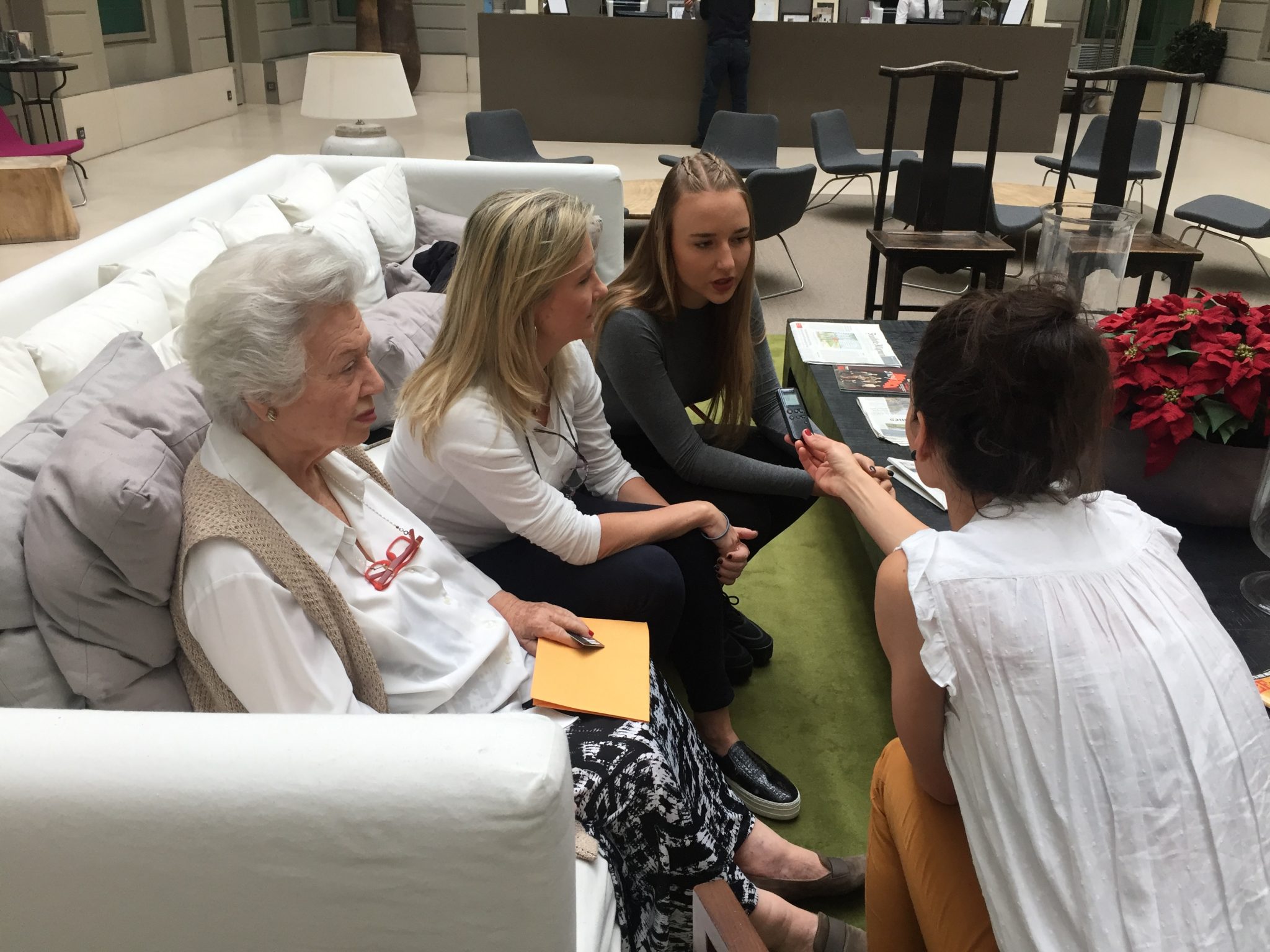
From left to right: Judit Kristóffy Nyisztor, her daughter, Ildikó Nyisztor and granddaughter, Zsófia Mirabal.
Zsófi, do your Venezuelan friends ask you about Hungary? It is really far from Venezuela, they must not really hear much about us.
ZSM: Yes, I talk about it a lot, and I always say it’s my second country- that it is a very nice country and I love it. I have a friend to whom I have told so much about Hungary that he wants to come to Budapest with me and he would be happy to study here as well.
Then scouting is pretty good image-building for Hungary…
JKNY: Yes, we say many good things about Hungary. Hungarians living abroad can advertise the country very well. And indeed, for many people it is actually their first time hearing that there is such a country in Europe.
***
Interview by Zsófia Nagy-Vargha/Ungarn Heute
Translation by Fanni Kaszás/Hungary Today